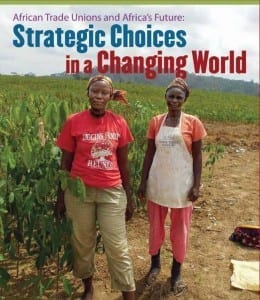Aug 8, 2014
 Meeting in Washington, D.C., this week, 40 African trade union leaders highlighted creation of good jobs, social protections and freedom to form unions as essential for Africa’s development. One way to do so is to make the African Growth and Opportunity Act (AGOA) work for working people.
Meeting in Washington, D.C., this week, 40 African trade union leaders highlighted creation of good jobs, social protections and freedom to form unions as essential for Africa’s development. One way to do so is to make the African Growth and Opportunity Act (AGOA) work for working people.
AGOA must have strong labor clauses “to ensure that workers’ rights are protected, they are given decent work,” said Caroline Khamati Mugalla, executive secretary of the East African Trade Union Confederation. Mugalla spoke with RadioLabour.
AGOA, which gives eligible sub-Saharan countries duty-free access to the U.S. market for a variety of products, is up for re-authorization in 2015. In the 15 years AGOA has been in effect, it has increased exports from sub-Saharan Africa, but by focusing mostly on tariff reductions, it has not spurred broader development or fostered a robust and equitable economic system.
Trade agreements must create decent work, Mugalla said, and decent work “is all about social dialogue, strengthening social dialogue to ensure that workers’ rights are actually met.”
African union leaders met as African heads of state took part in the US-Africa Summit August 4-6 in Washington, D.C.
Listen to the full interview.
Find out more about AGOA
Aug 1, 2014
 Nearly 40 trade union leaders from Africa are meeting in Washington, D.C., over coming days for a series of events to highlight the concerns and needs of working people throughout sub-Saharan Africa.
Nearly 40 trade union leaders from Africa are meeting in Washington, D.C., over coming days for a series of events to highlight the concerns and needs of working people throughout sub-Saharan Africa.
The meetings parallel the August 4-6 White House Summit for African heads of state, with union leaders seeking to influence public debate and hold leaders accountable over key issues such as decent jobs, social protections, gender equality and environmental sustainability.
On Monday, Liberian union leaders will take part in the panel “Trade Unions and Democracy from Below,” at the all-day “Empowered Africa” conference at Howard University, which is open to the public. Other events include forums on promoting decent work, inclusive development and a discussion on the Africa Growth and Opportunity Act (AGOA).
As a recent report by the AFL-CIO and Solidarity Center points out, in the 15 years AGOA has been in effect, it has increased exports from sub-Saharan Africa but has not spurred broader development or fostered a robust and equitable economic system.
Naome Chakanya, an economist with the Labor and Economic Development Research Institute of Zimbabwe (LEDRIZ) who will be among trade unionists in Washington, says workers are looking for “trade agreements which do not compromise the government’s ability to adequately provide social services (public goods) which include health, education, water, electricity.”
Trade agreements benefit African workers only if they include worker rights, social protection, employment creation and social dialogue, Chakanya says, listing the four elements that the International Labor Organization (ILO) defines as fundamental to decent work.
AGOA is due for reauthorization in September 2015. Reauthorization represents an opportunity to promote a coherent regional policy that benefits African workers and communities and addresses the challenges of a changing global economy. The White House Summit also includes an AGOA forum with finance and treasury ministers.
Achieving decent work also requires innovative approaches to addressing the informal economy, one of the key points in a new Solidarity Center report. Based on a 2013 survey of trade unionists in nine African countries, the report calls for worker associations and African governments to share experiences and invest more resources to empower workers in the informal economy and extend social protections to informal-sector workers, especially women. National and global economic trends suggest that more and more workers will seek to make a living in the informal economy in the face of fewer permanent, formal-sector jobs.
The report, “African Trade Unions and Africa’s Future: Strategic Choices in a Changing World,” also calls for enforcement of existing international worker rights standards. A broad body of international and national laws and standards protects workers and their rights, but they generally are not enforced, including by countries participating in programs like AGOA. As a result, workers are vulnerable to abuses such as unsafe and unhealthy workplaces, forced labor, lost wages, sexual harassment and workplace violence.
You can follow events throughout the week on Twitter with the hashtags #USAfrica, #AfricaSummit and #WeAreAfrica, and check back here for updates.
Jul 15, 2014
 The rapid economic growth of many African countries is not translating into good jobs or worker rights, especially for women, and worker organizations, governments and business must be more proactive in expanding employment and improving wages and social protections, according to a new Solidarity Center report.
The rapid economic growth of many African countries is not translating into good jobs or worker rights, especially for women, and worker organizations, governments and business must be more proactive in expanding employment and improving wages and social protections, according to a new Solidarity Center report.
“African Trade Unions and Africa’s Future: Strategic Choices in a Changing World” calls for measures to promote job creation, secure worker rights, invest in social and physical infrastructure and achieve gender equality.
Based on a 2013 survey of trade unionists in nine African countries, the report finds that trade unions have played a significant part in the political and economic lives of their countries, for instance by shaping policy around issues such as the minimum wage and social insurance coverage, and in promoting and defending democratic institutions.
But rapid globalization has created new challenges that will most effectively be solved through coordination among unions, government and business. Some of measures the report calls for include:
• Confronting obstacles to equal rights and equal participation for women. Sustainable development and inclusive economic growth are only possible when gender inequity, a key human rights component, is integrated throughout the process. Such actions should include opening up economic sectors and occupations that are still largely closed to women, as well as advancing education for women and social support for family obligations now primarily met by women.
• Taking innovative approaches to addressing the informal economy.National and global economic trends suggest that the proportion of workers in formal employment will continue to decrease. Worker associations and African governments need to share experiences and invest more resources to empower workers in the informal economy and extend social protections to informal-sector workers, especially women.
• Enforcing existing international worker rights standards. A broad body of international and national laws and standards protects workers and their rights, but they generally are not enforced, including by countries participating in programs like the Africa Growth and Opportunity Act (AGOA). As a result, workers are vulnerable to abuses such as unsafe and unhealthy workplaces, forced labor, lost wages, sexual harassment and workplace violence.
Released on the eve of the August 5–6 White House Africa Leaders Summit and the annual AGOA meeting, African Trade Unions and Africa’s Future serves as a clear call to action to the continent’s most powerful leaders and policymakers.
 Meeting in Washington, D.C., this week, 40 African trade union leaders highlighted creation of good jobs, social protections and freedom to form unions as essential for Africa’s development. One way to do so is to make the African Growth and Opportunity Act (AGOA) work for working people.
Meeting in Washington, D.C., this week, 40 African trade union leaders highlighted creation of good jobs, social protections and freedom to form unions as essential for Africa’s development. One way to do so is to make the African Growth and Opportunity Act (AGOA) work for working people.

